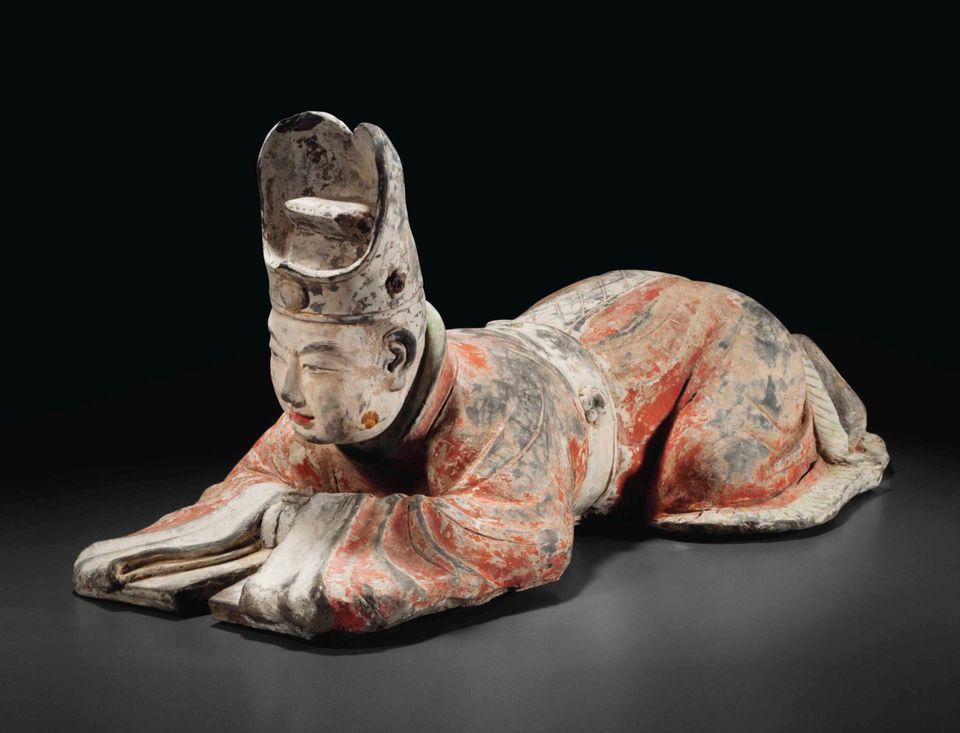Tao-Te-Ching 韬光 (Sheathing The Light, s.7)

Please see the previous sections before reading this one: https://sikh-translations.ghost.io/tag/commentaries/
In the previous sections where Lao Tse Ji explained the nature of existence. Now, Lao Tse Ji are focused on preparing the soil of the mind to be able to connect to the Truth. They explain the importance of the humble nature of saints and where they receive their greatness and peace from.
ੴ ਸਤਿਗੁਰਪ੍ਰਸਾਦਿ
天长地久。
Manifestation (天地) [exists] constantly (长) and [seems] long-lasting (久).
天地所以能长且久者,以其不自生,故能长久。
The reason (所) manifestation (天地) exists constantly (长) and [for a] (且) long time [beyond our understanding] (久者) possibly (能) because (以), it does not use [up] (不以其) itself [for selfishness] (自) [& thus] gives birth (生),
Then [as a result] (故) can exist for a long time (能长久)
是以圣人后其身而身先,外其身而身存。
Therefore (是), the Saint (圣人) uses (以) their energy for themselves after [thinking about others first] (后其身; their self afterwards) yet (而) they are the most famous (身先; self is in the forefront).
Lao Tse Ji brings up this comparison as a way to instill humility. They use the monolithic greatness of the earth and the skies as the great givers. Their greatness has existed for so long and will continue to because of how giving they are. The earth is so long-lasting because it acts in favor of others. The earth gives us fertile land, animals, a place to live, etc. The Heavens/Sky gives rains and from other Chinese mythological aspects: it gives blessings and fortune. Their greatness is due to their selflessness. Likewise, the Saint does not spend their time indulging in themselves but in the service of others.
In Sri Sukhmani Sahib, Dhan Dhan Sri Guru Arjan Dev Sahib Ji Maharaj bless us with the following bachans:
ਸਗਲ ਪੁਰਖ ਮਹਿ; ਪੁਰਖੁ ਪ੍ਰਧਾਨੁ ॥
Sagal Purakh Mah[i] Purakh[u] Pradhhaan[u]
Among all people, the highest person is...
ਸਾਧਸੰਗਿ; ਜਾ ਕਾ ਮਿਟੈ ਅਭਿਮਾਨੁ ॥
Saadhhsa[n]g[i] Jaa Kaa Mitai Abhimaan[u]
[the one] who goes to SaadhSangat, where their pride is wiped
ਆਪਸ ਕਉ; ਜੋ ਜਾਣੈ ਨੀਚਾ ॥
Aapas Ko[u] Jo JaaNai Neechaa
Whoever knows themselves as lowly,
ਸੋਊ ਗਨੀਐ; ਸਭ ਤੇ ਊਚਾ ॥
So-oo Ganeeai Sabh Thae Oochaa
They are recognized to be the highest!
(Ang 266)
ਬ੍ਰਹਮਗਿਆਨੀ ਕੈ; ਗਰੀਬੀ ਸਮਾਹਾ ॥
Brahamgiaanee Kai Gareebee Samaahaa
The Brahmgiani is the form of humility gathered in one place
ਬ੍ਰਹਮਗਿਆਨੀ; ਪਰਉਪਕਾਰ ਉਮਾਹਾ ॥
Brahamgiaanee Paroupkaar Oumaahaa
The Brahmgiani inspires benevolence/kind actions
(Ang 273)
非以其无私邪?
Not using (非以) their self (无其) [for] unhealthily (邪) selfishness (私)
[meaning going outside of physical needs for sustaining the body such as food, shelter, etc]?
故能成其私。
Might possibly (能成) happen (故) for the purpose of self-success (成其私).
What is the reason for this selflessness? It may be to attain their Ultimate Goal. What purpose can someone serve by being humble or how can it help in the spiritual journey?
Again, Sri Sukhmani Sahib gives us such an eye-opening updesh:
ਧਨ ਭੂਮਿ ਕਾ; ਜੋ ਕਰੈ ਗੁਮਾਨੁ ॥
Dhan Bhoom[i] Kaa Jo Karai Gumaan[u]
Whoever becomes arrogant of their land and wealth...
ਸੋ ਮੂਰਖੁ; ਅੰਧਾ ਅਗਿਆਨੁ ॥
So Moorakh[u] A[n]dhhaa Agiaan[u]
Know them to be an idiot, and in a state of blindness and ignorance
ਕਰਿ ਕਿਰਪਾ; ਜਿਸ ਕੈ ਹਿਰਦੈ. ਗਰੀਬੀ ਬਸਾਵੈ ॥
Kar[i] Kirpaa Jis Kai Hirdhai Gareebee Basaavai
If Guru Sahib does Kirpa, whoever has humility living in their Heart...
ਨਾਨਕ. ਈਹਾ ਮੁਕਤੁ; ਆਗੈ ਸੁਖੁ ਪਾਵੈ ॥੧॥
Nanak Eehaa Mukath[u] Aagai Sukh[u] Paavai
Dhan Sri Guru Arjan Dev Sahib Ji: ... is liberated from this world and will find peace ahead (after death).
(Ang 278)
Maharaj states that the Saint will receive liberation from the cycle of reincarnation and merge into Vaheguru. It may seem that humility is a trait that will receive a reward in exchange for having it but humility is a result of bhagti and a change of perspective towards the world we live in. In the last few sections, there was a deep focus on understanding Vaheguru’s Nirgun Saroop and Sargun/Maya Saroop. This section is also connected to this.
This section shows us the result of the Saint who sees this world for what it is.
Ego is attached to this world. When the individual views this world as the shadow of Vaheguru then what really belongs to them, to begin with? Their body, wealth, status, etc are seen as false and all truly belonging to Sri Akaal Purakh.
Bhagat Kabeer Ji beautifully exemplify this state in dialogue with Vaheguru:
ਕਬੀਰ ਮੇਰਾ ਮੁਝ ਮਹਿ, ਕਿਛੁ ਨਹੀ; ਜੋ ਕਿਛੁ ਹੈ, ਸੋ ਤੇਰਾ ॥
Kabeer Maeraa Mujh Mah[i] Kichh[u] nahee Jo Kichh[u] Hai So Thaeraa
Bhagat Kabeer Ji: Mine within me, does not exist; Whatever it is, it is Yours!
ਤੇਰਾ ਤੁਝ ਕਉ ਸਉਪਤੇ; ਕਿਆ ਲਾਗੈ ਮੇਰਾ ॥੨੦੩॥
Thaeraa Kujh Ko[u] Soupathae Kiaa Laagai Maeraa
Surrendering that which [already] belongs to You, what have I actually given?
The Saint only sees Vaheguru. So they realize the actual value of the ego: nothing. The ego/self is seen as lowly as a result of having understood the true nature of the world. Dhan Dhan Sri Guru Amardas Ji Maharaj bless us with this understanding in Raag Maajh:
ਅੰਤਰਿ ਤਤੁ ਗਿਆਨਿ; ਹਉਮੈ ਮਾਰੇ॥
A[n]thar[i] Thath[u] Giaan[i] Houmai Maarae
Internally, The Knower of the Essence of Reality will kill the ego
(Ang 128)
Getting to this worldview is not as simple as just understanding this point.
It can be written out or spoken but to actually be able to make this practical requires Bhagti (Baavan Akhree by Dhan Dhan Sri Guru Arjan Dev Sahib Ji):
ਸੋਧਤ ਸੋਧਤ ਸੋਧਿ ਬੀਚਾਰਾ ॥
Sodhhath Sodhhath Sodhh[i] Beechaaraa
Reflecting, Reflecting, I have concluded on this thought/reflection:
*Sodhhnaa means to make pure/clean, the act of purifying the mind is to take out misperception like we do through Gurbani Veechaar
ਬਿਨੁ ਹਰਿ ਭਗਤਿ; ਨਹੀ ਛੁਟਕਾਰਾ ॥
Bin[u] Har[i] Bhagath[i] nahee Chhutkaaraa
Without the Vaheguru’s Bhagti, [I] will not receive freedom [from this world/reincarnation/karams)
ਸੋ ਹਰਿ ਭਜਨੁ; ਸਾਧ ਕੈ ਸੰਗਿ ॥
So Har[i] Bhajan[u] Saadhh Kai Sa[n]g
Therefore, praise and sing about the Qualities of Vaheguru among SaadhSangat
ਮਨੁ ਤਨੁ ਰਾਪੈ; ਹਰਿ ਕੈ ਰੰਗਿ ॥੩॥
Man[u] Than[u] Raapai Har[i] Kai Ra[n]g[i]
Colour the Mind and Body in the Colour of Vaheguru
(Ang 260)
–
Please forgive any mistakes in commentary/translations. Please let daas know about any clarifications or suggestions.
Guru Panth Ka Daas
~Aaeenaa

